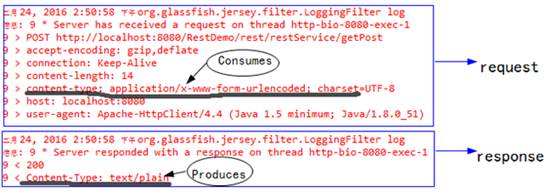要设置开发环境,您需要以下内容:
-
IDE:Eclipse IDE
-
Jdk
-
Web 容器:Apache Tomcat 7.0
-
Jersey 库:Jersey ,包含所有必需的库
-

在Eclipse中创建一个web工程
首先,为 Eclipse 上的 Tomcat创建服务器运行时。这是用于 RESTful Web 应用程序的 Web 容器。然后创建一个名为 “RestDemo” 应用程序,并将目标运行时指定为 Tomcat 。
最后,从 Jersey 开发包中将以下库复制到 WEB-INF 下的库目录
| 方法 | 资源集合, URI 如: http://host/<appctx>/resources |
成员资源,URI 如: http://host/<appctx>/resources/1234 |
| GET | 列出资源集合的所有成员。 | 检索标识为 1234 的资源的表示形式 |
| PUT | 使用一个集合更新(替换)另一个集合。 | 更新标记为 1234 的数字资源。 |
| POST | 在集合中创建数字资源,其 ID 是自动分配的。 | 在下面创建一个子资源。 |
| DELETE | 删除整个资源集合。 | 删除标记为 1234 的数字资源。 |
1、@Path
@Path 注释被用来描述根资源、子资源方法或子资源的位置
在cn.com.service包下创建第一个helloworld
package cn.com.service;
import javax.ws.rs.GET;
import javax.ws.rs.Path;
@Path("/restService")
publicclass Hello {
@Path("/getHello")
@GET
public String getHello() {
// TODO Auto-generated constructor stub
return"helloWorld";
}
}2、将Hello服务部署发布
1)配置web.xml文件
<?xmlversion="1.0"encoding="UTF-8"?>
<web-appxmlns:xsi="http://www.w3.org/2001/XMLSchema-instance"
xmlns="http://java.sun.com/xml/ns/javaee"
xsi:schemaLocation="http://java.sun.com/xml/ns/javaee http://java.sun.com/xml/ns/javaee/web-app_3_0.xsd"
id="WebApp_ID"version="3.0">
<display-name>RestDemo</display-name>
<servlet>
<servlet-name>testDemo</servlet-name>
<servlet-class>org.glassfish.jersey.servlet.ServletContainer</servlet-class>
<!-- 初始化servlet范围内的参数 -->
<init-param>
<param-name>javax.ws.rs.Application</param-name>
<param-value>cn.com.info.RestApplication</param-value>
</init-param>
<load-on-startup>1</load-on-startup>
</servlet>
<servlet-mapping>
<servlet-name>testDemo</servlet-name>
<url-pattern>/rest/*</url-pattern>
</servlet-mapping>
<welcome-file-list>
<welcome-file>index.html</welcome-file>
</welcome-file-list>
</web-app>2)在包cn.com.info.RestApplication下创建RestApplication
public classRestApplicationextends ResourceConfig {
public RestApplication() {
// 服务类所在的包路径
packages("cn.com.service");
//注册JSON转换器
register(JacksonJsonProvider.class);
// 打印访问日志,便于跟踪调试,正式发布可清除
register(LoggingFilter.class);
}
}
3)将项目部署到tomcat,
启动服务输入http://localhost:8080/RestDemo/rest/restService/getHello
查看返回结果为“hello”
3、@Path("/users/{username}")和@PathParam
@path(“/users/{username}”)username为在url后面紧跟的参数,如果要获取到就用@PathParam
package cn.com.service;
import javax.ws.rs.GET;
import javax.ws.rs.Path;
import javax.ws.rs.PathParam;
import javax.ws.rs.Produces;
@Path("/restService")
public class HelloParam {
@Path("/getHello/{username}")
@GET
public String getHello(@PathParam("username") String username) {
// TODO Auto-generated constructor stub
return username;
}
}输入http://localhost:8080/RestDemo/rest/restService/getHello/Liliei
返回信息为:Lilei
4、@Conumes 和 @Produces和@FormParam
@Consumes 注释代表的是一个资源可以接受的 MIME 类型。
@Produces 注释代表的是一个资源可以返回的 MIME 类型。这些注释均可在资源、资源方法、子资源方法、子资源定位器或子资源内找到
@FormParam,请求的数据来源于表单中的参数
package cn.com.service;
import javax.ws.rs.Consumes;
import javax.ws.rs.FormParam;
import javax.ws.rs.POST;
import javax.ws.rs.Path;
import javax.ws.rs.Produces;
@Path("/restService")
public class FormPostParam {
@Path("/getPost")
@POST
@Consumes("application/x-www-form-urlencoded")
@Produces("text/plain")
public String getPost(@FormParam("name") String name) {
// TODO Auto-generated constructor stub
return name;
}
}使用restClient,调取http://localhost:8080/RestDemo/rest/restService/getPost
Post参数name=helloTest
查看后台日志信息
5、@Context获取上下文
@Path("/getHeaders")
@GET
@Produces("application/json; charset=UTF-8")
public String getHeader(@Context HttpHeaders hh) {
MultivaluedMap<String, String> headerParams = hh.getRequestHeaders();
returnheaderParams.toString();
}使用RestClient输入http://localhost:8080/RestDemo/rest/restService/getHeaders
返回:{host=[localhost:8080], connection=[Keep-Alive], user-agent=[Apache-HttpClient/4.4 (Java 1.5 minimum; Java/1.8.0_51)], accept-encoding=[gzip,deflate]}
6、@DefaultValue和@QueryParam
@DefaultValue,默认值
@QueryParam查询时传入的参数值,列XXXXXXXX:8080/ddd?in=1&from=3
@Path("/restService")
publicclass DefaultValues {
@Path("/getDefaultValue")
@GET
public String getDefaultValue(@DefaultValue("1000") @QueryParam("from") intfrom,
@DefaultValue("999")@QueryParam("to") intto) {
return"getDefaultValue is called, from : " + from + ", to : " + to;
}
}浏览器输入:http://localhost:8080/RestDemo/rest/restService/getDefaultValue
得到结果:getDefaultValue is called, from : 1000, to : 999
浏览器输入:http://localhost:8080/RestDemo/rest/restService/getDefaultValue?from=9&to=12
得到结果:getDefaultValue is called, from : 9, to : 12
欢迎大家关注微信公众号与QQ群进行交流

来源:oschina
链接:https://my.oschina.net/u/1391889/blog/620951


